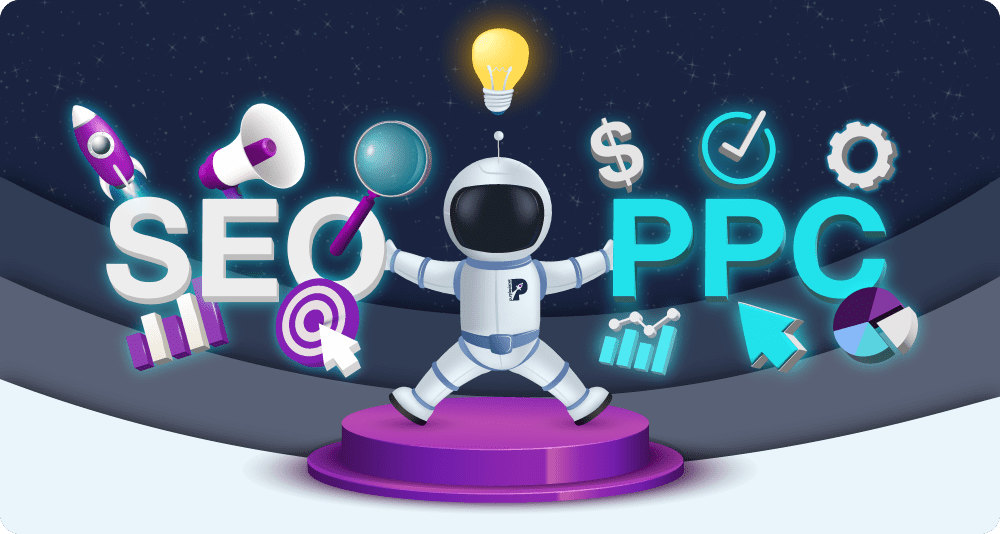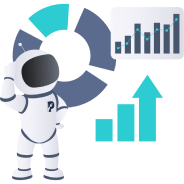

SEO vs. PPC – Everything You Need to Know
Hailed as two of the most powerful digital marketing methods, search engine optimisation (SEO) and pay-per-click advertising (PPC) are game changers for any business. Not only do they contribute to high-quality traffic and conversions — but they also give a business a distinct competitive edge.
The question is: which one should you focus on? Well, the answer isn’t clear-cut. In fact, when it comes to deciding on the right tactic, there are lots of factors to consider. We’ll be breaking things down and taking you through the ins and outs of both, so you can make the best decision for your business. Let’s dive in.
What is SEO?
Search engine optimisation or SEO is the set of activities involved with increasing your website’s visibility and rankings on search engine results pages (SERPs). SEO is implemented with the goal of gaining organic traffic, which is often cited as one of the most valuable and consistent traffic sources for a business.
Google is the webʼs most popular search engine. So, it isn’t surprising that real estate on the first page of the search results guarantees scores of high-quality traffic. To bag a lucrative spot, you’ll need to focus on website architecture, content creation, as well as some 200 other ranking factors that Google takes into consideration.
In a nutshell, SEO consists of the following:
- Keyword research: figuring out what your audience is searching for
- On-page SEO: creating content that your audience is searching for
- Off-page SEO: establishing trust and authority through other websites
- Technical SEO: ensuring search engines can find, crawl, and index your content
What Is PPC?
Like SEO, pay-per-click (or PPC) is a form of search engine marketing. PPC involves hosting your ads with a publisher like Google or Facebook and paying each time users click on your ads.
Reaching over 90% of all internet users, Google’s Display Network is the most popular advertising network on the web. As PPC ads appear above organic search results, they can boost visibility, leads, and conversions.
Essentially, PPC involves:
- Keyword research: establishing what your customers are searching for
- Bid setting: determining how much you want to pay per ad click
- Ad creation: designing relevant, compelling ads
- Audience targeting: selecting who should see your ads
- Audience retargeting: selecting who should see your ads again
SEO vs. PPC
Although SEO and PPC are both keyword-driven strategies, they differ in several important ways. Notably, PPC involves paying for traffic via targeted ads, while SEO involves earning traffic rankings on SERPs. Other differences include the following:
Visibility
Both tactics offer great visibility, with PPC ads sitting above organic listings. Although many improvements have been made to paid search in recent years, most internet users still prefer organic search results.
Cost and ROI
Even though creating relevant ads and getting a strong quality score tends to lower your costs over time, PPC can still be expensive. With on-page, off-page, and technical SEO, costs can add up pretty quickly too.
However, even taking the cost of SEO into account, it is still more cost-effective than PPC in the long run. And unlike paid traffic, organic traffic is scalable and comes at no additional cost.
Strategic focus
SEO is better suited to long-term goals and low-competition keywords, while PPC is better suited to short-term goals and high-competition keywords. The same PPC campaigns aren’t sustainable over the long term (due to factors like ad staleness or ad blindness), but top organic listings are effective even after years.
Strengths and weaknesses
Lastly, each tactic has its own set of benefits and limitations. We’ll run through them below:
Pros of SEO:
- High-quality traffic
- More organic conversions
- 24/7 visibility
- Not affected by budget constraints
- Cheaper in the long run
- Increases brand authority
- Supports different stages of the customer journey
- More customer-friendly web experience
- Increases backlinking potential
The cons of SEO:
- Time-consuming
- Complicated to manage
- Slow returns
- New domains are at a disadvantage
- Content must be updated regularly
- Algorithms and ranking factors change constantly
The pros of PPC:
- Visibility above organic rankings
- Quicker results
- Higher conversion rates
- Better targeting and customisation
- Testing and tracking are easier
- Highlights key business information in a way that SEO doesn’t
- Provides detailed data to improve other marketing strategies
The cons of PPC:
- Affected by budget constraints
- High cost-per-click in very competitive industries
- Higher customer acquisition costs
- Lower return on investment
- High-quality scores are time-consuming and expensive
- Less visibility if competitors bid more
- Constant updates are needed to combat ad blindness
- Constant testing is required to continue delivering results
How Do I Choose Between PPC and SEO?
While SEO and PPC are both great strategies for increasing brand visibility and generating leads, choosing between them is largely about finding the best fit for your needs, goals, and budget. Let’s consider the following:
Needs
To choose between SEO and PPC, let your most pressing needs guide you. Do you urgently need leads and sales? Then paid search is the way to go. Are you looking to position your business as an expert in your field? Then consider SEO.
Goals
Remember to look at your short and long-term goals too. If you’re just starting out and have the budget for it, PPC is a great way to gain visibility and leads. Short-term goals with a sense of urgency, such as promoting active marketing campaigns or events, benefit more from PPC ads. Long-term goals, such as reaching the top of SERPs or outranking your competitors, are better suited to a comprehensive SEO strategy.
Budget
What is your budget? While SEO is suited to a modest budget, PPC isn’t. Quick wins are a guarantee with PPC, but over time ads can get stale, and acquisition costs may become a major limiting factor.
If you’re prepared to invest in a great SEO strategy, your efforts will eventually pay off. Alternatively, if you can afford to focus on both SEO and PPC, that may be even more beneficial for your business.
Consider SEO if you:
- Have a limited marketing budget
- Want a greater ROI over the long-term
- Want to establish brand authority
- Want to create quality content to cater to your audience
Consider PPC if you:
- Need leads and sales quickly
- Want to promote time-sensitive offers
- Want to create interest and awareness for your products
Which Is Best for Your Brand?
To decide whether SEO or PPC is better for your brand, consider the nature of your business and your audience. From a strategic standpoint, you should also be able to answer the following questions:
- Are you willing to play the long game?
- What’s your competition like in organic search?
- What is the cost per click in paid search for your industry?
- Do you have domain authority?
Consider the nature of your business
What industry are you in? Do you offer products or services? The business services industry gets 73% of its traffic through organic search, so if you’re a service business, you may want to consider a solid SEO strategy. If you’re a small local business needing a few leads a week, you could see great results from local organic search visibility even in the short term, especially if you face little competition.
However, if you run a new online store, for example, you’ll struggle to outrank fierce competitors like eBay or Amazon over the short term and would probably gain more from a good paid search strategy.
Consider your audience
Are your ideal customers searching for information or ready to buy? How do they navigate the web? Would a paid or organic search strategy serve them better? Answering all these questions about your audience will help you determine the best approach for your business.
SEO and PPC: An Integrated Approach
There’s no doubt that focusing on even one of these tactics can do wonders for your business. However, if you want top-notch results, you might consider an integrated approach. As each tactic has its own merits and limitations, combining them tends to balance
things out. Additionally, SEO and PPC tend to support not only each other but all your other digital marketing efforts too.
6 reasons to use both SEO and PPC:
1. You can target your audience at every stage of the customer journey.
2. You can increase traffic and conversions.
3. The insights you gather from PPC (keywords, conversions, etc.) can be used to bolster your SEO efforts.
4. The copy and content that resonates with your audience can be used to guide your content strategy.
5. Testing the effectiveness of your landing pages and ad copy can guide your decision-making for both SEO and PPC.
6. You can refine your keyword strategy using PPC before investing in long-term SEO strategies.
Should I Learn PPC or SEO?
Start with what would work best for your business right now and venture out from there. When it comes to learning SEO and PPC, knowledge in one area tends to feed into the other, so, an integrated learning approach could be advantageous.
While both tactics have steep learning curves, a general understanding of either can have a considerable effect on how you run your business. As a business owner, aim to have a general understanding of how both tactics can help your company. If you have more time to dedicate to learning, explore how both strategies tie into your digital marketing strategy and overall business goals.
Learning SEO
To succeed at SEO, you’ll need to learn how to leverage keyword research, link strategies, technical SEO, and content. You’ll have to monitor and update your site and content to maintain or increase your rankings. An understanding of Google’s ranking factors and a commitment to adhering to their guidelines will also be crucial.
Additionally, you’ll need to stay up to date with ever-changing SEO best practices. So, there’s a lot to learn and keep learning. The great news is that SEO guarantees a deeper understanding of your audience, which can benefit other marketing areas as well.
Learning PPC
Designing effective PPC campaigns will require you to excel at navigating ad platforms, keyword research, bidding, ad creation and landing page design. PPC can be challenging to set up, not to mention ad platforms like Google Ads can be complicated to figure out.
However, once you nail it down and start to provide great ads, your quality scores and conversion rates will improve. Again, the great news is that PPC provides deep insight into your audience and their behaviour, which can power SEO and other marketing areas as well.
Get the right tools
In addition to knowledge, you’ll need the right tools to master both strategies. Google Trends and Keyword Planner are essential free tools for both SEO and PPC. They’re great for providing insight into competitors and the factors associated with being able to rank for the search terms you’re going after.
Paid tools such as Ahrefs, SEMRush and Moz can be used for more in-depth keyword research, competitor analysis and content planning for both SEO and PPC.
Aim for knowledge but hire skills
SEO is incredibly time-consuming — even with all the right tools and guidance, you still need to create content, optimise your on-page elements, and build links. PPC isn’t any different; while it might seem easy to create ads and display them to a certain audience, building effective PPC campaigns takes a lot of skill and knowledge.
Ad platforms are tricky to navigate, and there’s the added challenge of understanding how to optimise your bids, keywords, and landing pages.
Rarely are any of these things possible without a great in-house team or the help of a digital marketing agency. Instead of doing all the heavy lifting yourself, consider getting professional help; you’ll see far greater returns that way.
Final Thoughts
Ultimately, whether you focus on SEO or PPC will depend on several factors. Along with your business’s unique goals and needs, carefully weigh the benefits and drawbacks of each approach. You’ll be able to make a more informed decision that way. If you’re able to use both SEO and PPC, go for it, you stand to amplify your results and achieve greater growth for your business.











